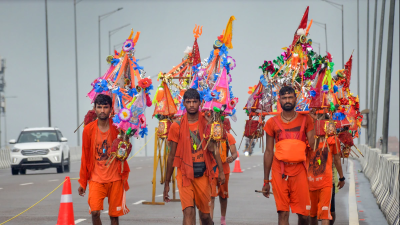Context-
As the annual Kanwar Yatra, the pilgrimage of Kanwariyas (devotees of Lord Shiva) draws near, Muzaffarnagar finds itself at the heart of escalating communal strife.
Historical Context and Demographic Diversity
Muzaffarnagar, a city in western Uttar Pradesh, India, holds a significant place in history as it was founded in 1633 by Syed Muzaffar Khan, a Mughal chieftain. Muzaffarnagar's rich history is marked by both prosperity and conflict. The city, which has been a site of significant communal violence in the past, also boasts a vibrant cultural and economic landscape. The population of western Uttar Pradesh comprises Jat farmers, cattle-rearing Gujjars, and Muslims. The region is renowned for its extensive orchards, which produce some of the finest mangoes, lychees, and guavas, and has a flourishing economy supported by sugar industries, steel, and paper mills. Muzaffarnagar's strategic location along major national highways further underscores its importance.
Recent Developments and Tensions
Recently, the city has seen a rise in tensions, particularly during the Kanwar Yatra. The pilgrimage, which involves devotees walking long distances carrying water from the Ganga to Shiva temples, has become a battleground for political and communal clashes. The state government’s polarizing stance has exacerbated these tensions, adding a layer of complexity to the already volatile situation.
State Government's Directive and Community Reactions
In a recent development, the Deputy Inspector General (DIG) of the area issued an order requiring eateries and vendors along the Delhi-Haridwar route to display their names along with caste and religion identifiers. This directive was aimed at ensuring that Kanwariyas could distinguish between establishments serving "pure" Hindu vegetarian food and those run by Muslims. The order was met with significant backlash. Critics, including some minority leaders within the BJP, argued that such measures would reinforce untouchability and further isolate Muslim communities.
Political and Social Implications
The political implications of the directive are significant. The Chief Minister's office supported the order, underscoring a commitment to protecting Hindu interests and asserting dominance in the wake of the 2024 elections. The emphasis on ensuring "kosher" food for Kanwariyas highlights a broader trend towards religious and communal exclusivity, overshadowing principles of secularism and inclusivity.
The Impact on Minorities
The Kanwar Yatra's nationalist and religious overtones have implications for minority communities. Historical instances, such as the 2018 eviction of 70 Muslim families in Lucknow due to “red cards” issued by the police, illustrate the fear and discrimination faced by minorities in the wake of such events. The state's involvement in protecting and supporting the yatra can contribute to a sense of insecurity among minorities, highlighting the blurred lines between secular governance and religious favoritism.
The Larger Cultural and Ideological Conflict
The ongoing situation in Muzaffarnagar is part of a broader conflict over cultural and ideological spaces in India. The hybrid culture, which historically embraced a fusion of communities, languages, and art forms, is increasingly under threat from forces advocating for racial and religious purity. This shift towards exclusivism is pushing marginalized communities into ghettos and undermining the rich tapestry of India's pluralistic society.
The rise of sectarian and communal agendas poses a serious challenge to the spirit of inclusivity and secularism. The cultural space that once celebrated diversity and hybridization is now being eroded by demands for purity and segregation. The Kanwar Yatra controversy is emblematic of this larger struggle, where traditional practices are being co-opted into political and ideological battles.
Strategic Considerations for Addressing the Crisis
Addressing the current crisis requires a nuanced approach that goes beyond mere political engagement. It is essential to recognize the broader cultural and ideological dimensions of the conflict and to engage with them constructively. Simply opposing the government or engaging in regional and sectarian rhetoric will not suffice.
A comprehensive strategy must involve:
1. Promoting Dialogue: Encourage open and honest dialogue between communities to address misunderstandings and build trust. This involves creating platforms for cross-community interactions and addressing grievances constructively.
2. Strengthening Secular Values: Reinforce the principles of secularism and inclusivity in public discourse and policy-making. Ensure that government policies and directives do not perpetuate communal divisions or reinforce sectarian biases.
3. Protecting Cultural Hybridization: Advocate for the preservation and celebration of India's hybrid cultural heritage. Support initiatives that promote cultural exchange and mutual respect among diverse communities.
4. Monitoring and Accountability: Implement mechanisms to monitor the impact of communal policies and ensure accountability for actions that exacerbate tensions or violate rights. This includes holding officials accountable for discriminatory directives and promoting transparency in governance.
5. Encouraging Empathy and Rationality: Foster a culture of empathy and rationality in public debates. Challenge narratives that seek to polarize communities and promote a more inclusive and understanding approach to addressing societal issues.
Conclusion
The situation in Muzaffarnagar during the Kanwar Yatra underscores a critical moment in India's ongoing struggle with communalism and cultural purity. The clash between hybrid cultural practices and demands for exclusivism reflects deeper ideological conflicts that are reshaping the social and political landscape. Addressing these challenges requires a concerted effort to uphold secular values, promote dialogue, and protect cultural diversity. As the country navigates these turbulent waters, it is crucial to engage with the complexities of the situation honestly and proactively, ensuring that the principles of inclusivity and mutual respect remain central to the national discourse.
|
Probable Questions for UPSC Mains Exam- 1. How has the Kanwar Yatra evolved from a traditional religious pilgrimage to a platform for political and nationalistic expression, and what are the implications of this transformation for communal relations and secular governance in India? (10 Marks, 150 Words) 2. What are the socio-economic impacts of the Kanwar Yatra on local communities, particularly small vendors and marginalized groups, and how should authorities address these impacts to ensure fair treatment and maintain communal harmony? (15 Marks, 250 Words) |
Source- Indian







